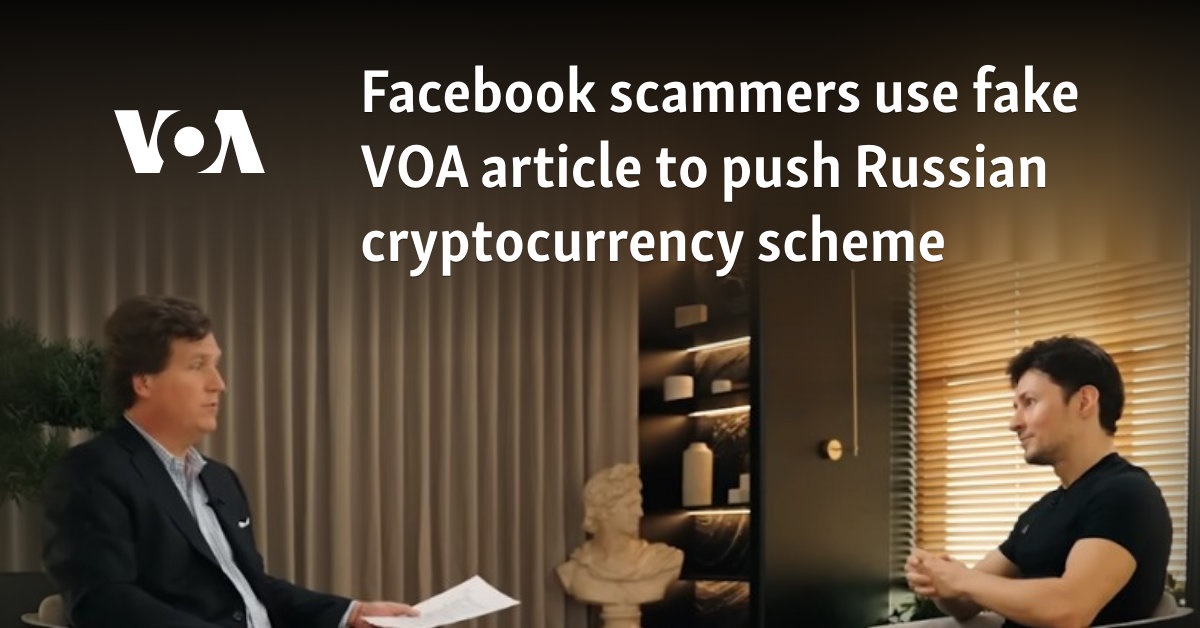Summary:
Scammers exploited a fake VOA article to promote a cryptocurrency scheme.
The scam promised $13,000 monthly earnings to attract investors.
The scheme used hacked Facebook accounts spanning multiple countries.
Both Tucker Carlson and Pavel Durov are not involved in the scam.
Meta emphasizes a strong stance against fraud on its platforms.
The Scams Behind the Scenes
When American conservative commentator Tucker Carlson interviewed Russian IT entrepreneur Pavel Durov in April, it unexpectedly caught the attention of scammers. After the interview, a phony Russian-language transcript emerged, enticing potential “investors” into a cryptocurrency scheme promising monthly earnings of $13,000. This fraudulent scheme came to light when its creators used a copy of a VOA Russian article page to deceive internet users.
Exploiting Trust
These scammers often utilize hacked Facebook accounts to advertise their schemes, affecting users across countries like the Philippines, Mexico, and Afghanistan. Jordan Liles from Snopes.com notes the alarming trend of scams impersonating reputable publishers to fool unsuspecting victims.
No Involvement from Durov or Carlson
There is no evidence linking Durov or Carlson to the scam, and attempts by VOA to reach them went unanswered. In response to the issue, Meta, Facebook's parent company, emphasized its commitment to combating scams and fraud on its platforms.
The Low-Tech Approach
While some scams have employed deepfake technology, this particular scheme took a more straightforward route, using a Q&A-style text transcript that falsely claimed to continue Carlson’s interview with Durov. The fraudulent narrative suggested that Durov had unveiled ProTON-Invest, a program allowing anyone to earn substantial money effortlessly.
Tracing the Fraud
Investigating the origins of the ProTON-Invest scheme proved challenging as the fraudsters effectively concealed their tracks. VOA contacted the owners of the hacked Facebook accounts promoting the scheme, many of whom reported losing access to their pages. For instance, a page named “Simply News”, previously a plant and baked goods business, was hacked and exploited for these scams.
The Global Network of Scammers
The scammers utilized various accounts from diverse locations, including Vietnam, Bangladesh, Ukraine, and China. However, it remains unclear how Facebook verifies the locations of these account managers.
The Difficulty in Retaking Accounts
Once scammers take control of an account, they often change critical recovery information, making it nearly impossible for the original owners to regain access. Journalist Yuri, who lost his Facebook account to scammers, took nearly six months and legal assistance to reclaim it.
The Cost of Scamming
Creating these scams is relatively inexpensive, with Facebook advertising costing very little. As noted by Liles, even a $100 investment can yield hundreds or thousands in returns from victims.
Spotting the Scams
To avoid falling victim to such scams, internet users should verify the URL of any purported VOA page and look for the verification check mark across social media platforms. VOA representatives advise users to check their social media accounts for consistency and legitimacy to ensure they are accessing genuine information.




Comments